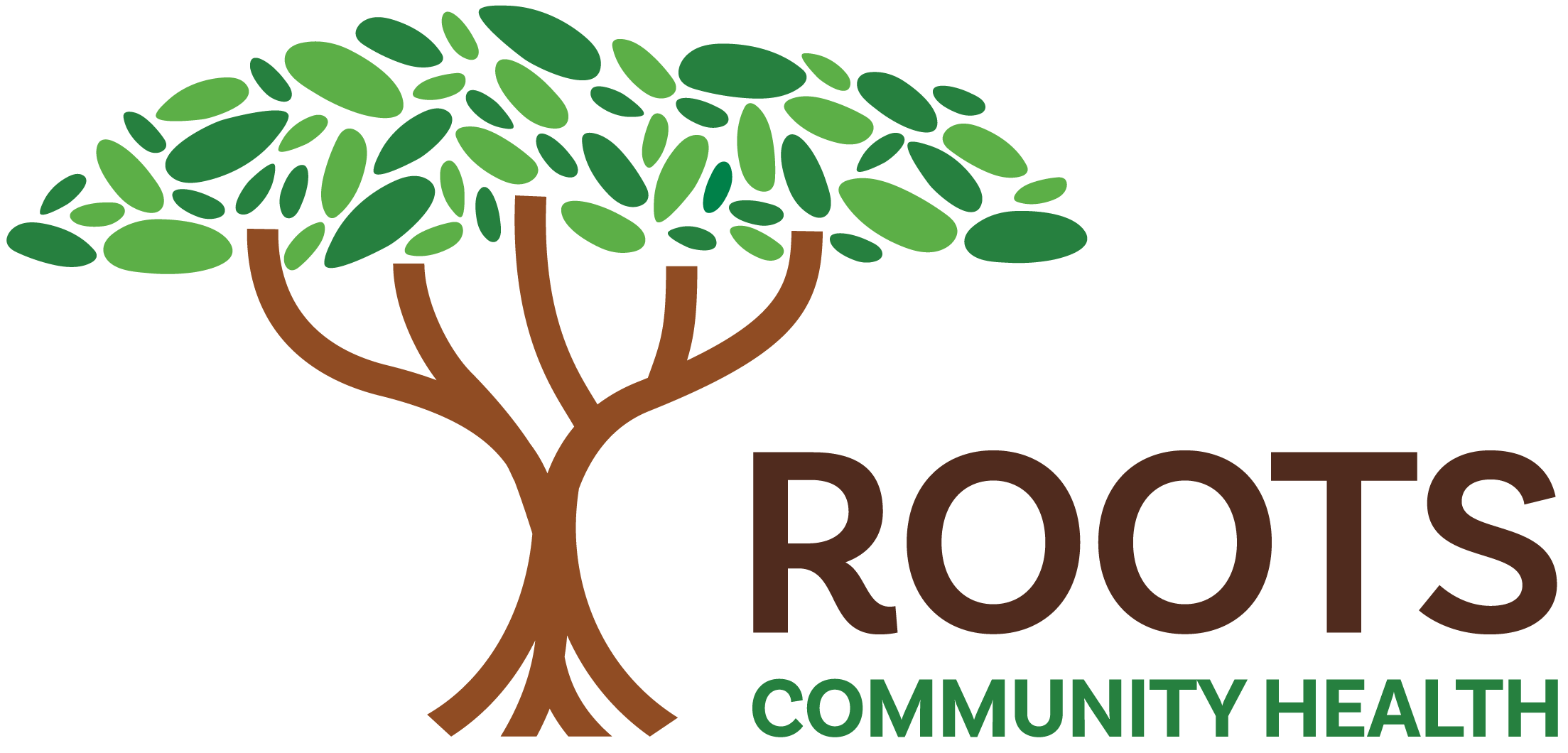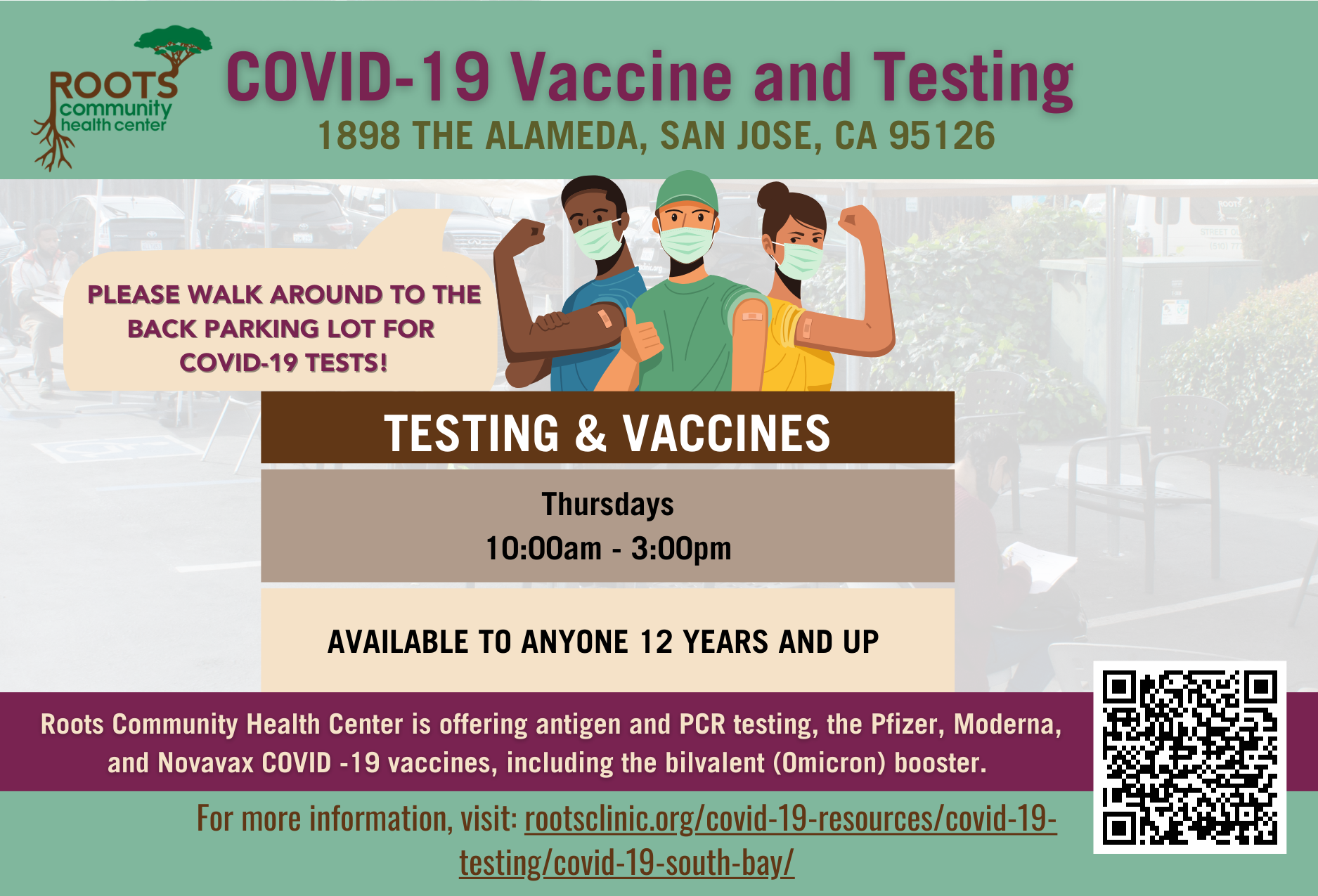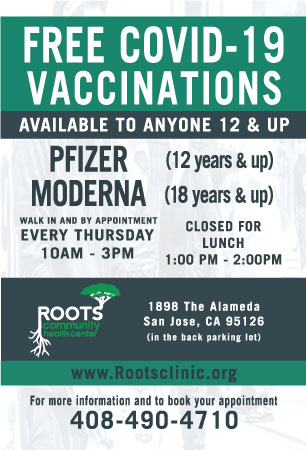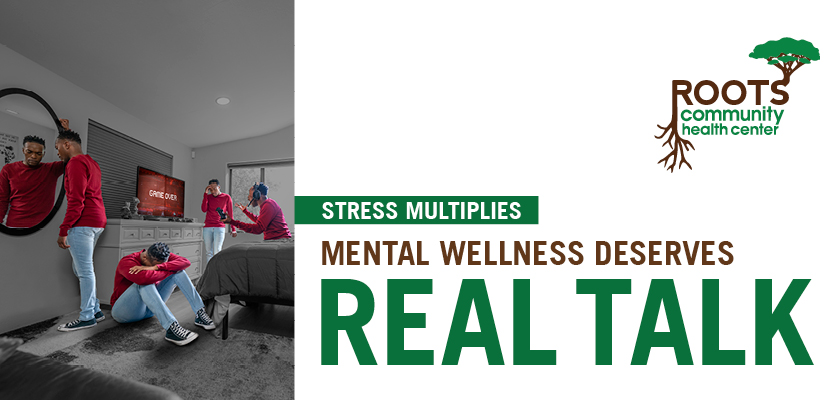COVID-19 Testing & Vaccine SB
We’re providing free walk-up COVID-19 testing & vaccines in San Jose.
Please Note: this is a walk-up vaccination site with no drive-up options and limited street parking.
Additionally, for your safety and ours, services may be suspended on heavy rain days.
We are also offering flu and MPOX vaccines as well as flu testing at the same time as COVID-19 vaccines and testing.
COVID-19 Testing FAQs
INSURANCE REQUIREMENTS
If you are uninsured or underinsured, we can still provide tests or vaccine to you for free (for the vaccine you must also be age 19+). If your insurance/insurance status is not on the list below, we may not be able to offer you the test or vaccine. You can still select “other” and fill out your insurance provider; our staff will check whether you are eligible when you arrive.
- Brown & Toland
- HealthPAC
- Medicare
- Medi-Cal
- Alameda Alliance for Health (Medi-Cal)
- Anthem Blue Cross (Medi-Cal)
- Valley Health Plan (Medi-Cal)
- Santa Clara Family Health Plan
- United Health Care
- Uninsured
- Underinsured (have a health plan but it does not provide testing free of charge)
- Most PPO’s – (e.g., Blue Cross, Anthem Blue Shield, please inquire)
If you do not qualify for the test/vaccine at Roots, please reach out to your medical provider or check these additional resources:
COVID Vaccines in Alameda County
COVID Vaccines in Santa Clara County
COVID Testing Santa Clara County
For the future, free COVID tests may also be requested by mail here: https://www.covid.gov/tests
TEST REGISTRATION
You may register here or just drop in for testing. If you are unable to register online, please register in person the day of your test.
Online pre-registration only takes about 3 minutes and can speed up the process when you arrive.
RESULTS
If you want your results emailed to you, make sure to check the “Test Results via Email” option on the registration form. If you decide you need an email copy AFTER you registered, please email us requesting results at [email protected]. Please include your name, date of birth and the date you were tested. Any missing information may delay locating your test results.
Please refrain from sending multiple email requests, as this can overload our system and cause an even bigger delay in sending out results. If you requested an email at the time of registration, you do not need to email a request for your results. Please expect an email response within 24-48* hours during the work week. We do not check the email on Thursdays (due to us testing) or the weekends.
*Depending on the amount of patients tested and the speed of the laboratory, these time frames are subject to change at any time.
If you want your results emailed to you, please email us requesting results at [email protected]. Please include your name, date of birth and the date you were tested. Please expect an email response within 24hrs.
SHOULD I GET TESTING FOR COVID-19?
If you want your results emailed to you, make sure to check the “Test Results via Email” option on the registration form. If you decide you need an email copy AFTER you registered, please email us requesting results at [email protected]. Please include your name, date of birth and the date you were tested. Any missing information may delay locating your test results.
The answer to this question depends on:
(1) Your symptoms. If you have COVID symptoms, it is a good idea to get tested, especially if you live in an area where COVID is circulating.
(2) Your exposure. If you think you were exposed to COVID-19, getting tested is a good idea for two reasons. First, if you know you are positive, you can isolate yourself away from others and prevent getting them sick. Second, if you know you are positive, you will probably keep a closer eye on your own symptoms, and may seek medical care more promptly if your condition worsens.
(3) Your risk to others. If you live or work with other people – especially those who may be at high risk for doing poorly if they get COVID – getting tested if you suspect you were exposed is an important part of protecting those people.
If you are sheltering in place, and not being exposed to others without masking and distancing, and if you have no symptoms, there may be no need for a test at all.
*Depending on the amount of patients tested and the speed of the laboratory, these time frames are subject to change at any time.
If you want your results emailed to you, please email us requesting results at [email protected]. Please include your name, date of birth and the date you were tested. Please expect an email response within 24hrs.
WHEN SHOULD I GET TESTED?
If you have symptoms, you can get tested at any time with a good chance of detecting the virus if you have it. If you think you have been exposed, wait 5-8 days before being tested to maximize the chances that the virus will be detected. If you have symptoms or think you have been exposed, one option is to self-quarantine for 14 days and not get tested at all. In the event that you will not expose yourself to others at all (self-quarantine in your own room), a test is not necessarily required because it will not change your management, and you are not at risk of exposing others. If this is the route you choose to take, please keep an eye on your symptoms and be sure to truly quarantine yourself from others.
WHAT DOES IT MEAN TO BE "EXPOSED"?
If you have symptoms, you can get tested at any time with a good chance of detecting the virus if you have it. If you think you have been exposed, wait 5-8 days before being tested to maximize the chances that the virus will be detected. If you have symptoms or think you have been exposed, one option is to self-quarantine for 14 days and not get tested at all. In the event that you will not expose yourself to others at all (self-quarantine in your own room), a test is not necessarily required because it will not change your management, and you are not at risk of exposing others. If this is the route you choose to take, please keep an eye on your symptoms and be sure to truly quarantine yourself from others.
WHAT KIND OF TEST SHOULD I GET
The “gold standard” for COVID detection is a PCR test. This test is very sensitive, meaning if you have COVID, it will detect it about 99% of the time. So if you test positive, we are most certain that you have the virus. If you test negative, though, there is a chance that you got tested too early to test positive, especially if you have no symptoms (see When should I get tested, above). Antibody tests are not useful for detecting current infection, or even for determining whether you are “immune” to COVID. We are not sure yet whether a person is in fact immune after having COVID, and if they are, for how long. Therefore, the antibody test is mostly for research purposes or to satisfy your curiosity, but is not useful in practice and would not change management or decision-making in any way. At Roots we are offering PCR testing to the community. If you are a Roots patient, and have tested positive for COVID in the past, speak to your provider about getting an antibody test for informational purposes only.
WHAT IF MY TEST COMES BACK NEGATIVE?
A negative test means that you did not have a COVID infection on the day you were tested. If you developed symptoms or think you were exposed after you took the test, you can get tested again. Or, if you think you got tested “too soon” after exposure (see When should I get tested, above), you can get tested again. No matter what, you should continue to follow current guidelines about hand washing, physical distancing, and wearing a face covering. COVID-19 is still active in the community and can be spread even by those who do not feel or look sick. Try to do your best with the guidelines so we can break the chain of infection!
WHAT IF MY TEST COMES BACK POSITIVE?
If you have a positive result, it means you have a COVID-19 infection. Most people with COVID-19 have a mild to moderate flu-like illness and do not need to go to the hospital. However, it will be important to regularly check on your symptoms and go to the emergency department for trouble breathing. You will also need to “isolate” yourself to prevent others from getting COVID, including the people you live with. This means you need to isolate in your own home (your own room if you live with others) and have someone bring you things you need like food. If you are or will now become unsheltered, we will help you get into safe shelter for isolation. When we call to give you your result, we will go through the orders for isolation and signs and symptoms to look out for.
You are required to follow County Isolation Orders for the county where you reside, even if you do not have symptoms. Following these instructions is critical to helping reduce the spread of COVID-19 in the community. We recommend that you notify your employer, your household members, and any other close contact in the 14 days leading up to your test.
HOW CAN I PROTECT OTHERS IN MY HOUSEHOLD IF I TEST POSTIVE OR IF I THINK I WAS EXPOSED?
If you have a positive result, it means you have a COVID-19 infection. Most people with COVID-19 have a mild to moderate flu-like illness and do not need to go to the hospital. However, it will be important to regularly check on your symptoms and go to the emergency department for trouble breathing. You will also need to “isolate” yourself to prevent others from getting COVID, including the people you live with. This means you need to isolate in your own home (your own room if you live with others) and have someone bring you things you need like food. If you are or will now become unsheltered, we will help you get into safe shelter for isolation. When we call to give you your result, we will go through the orders for isolation and signs and symptoms to look out for.
You are required to follow County Isolation Orders for the county where you reside, even if you do not have symptoms. Following these instructions is critical to helping reduce the spread of COVID-19 in the community. We recommend that you notify your employer, your household members, and any other close contact in the 14 days leading up to your test.
DO I NEED TO GET TESTED AGAIN AFTER I TEST POSITIVE?
No. In fact, the test is so sensitive that it will continue to detect the virus for weeks – more than a month in some cases. Repeat positive tests are meaningless to you because once you have completed your isolation period, you are no longer contagious. Also, taking repeat tests after you were positive takes up precious testing capacity in the community. Lastly, repeat positive tests take extra time for our team to sort out so that it is not counted as a “true” positive. We strive to call all positives immediately, so repeat positive tests threatens to clog up that system. All of this extra activity is unnecessary since once your isolation period is complete, you are no longer contagious and can go back to work or your regular activities (with a mask and distancing, of course!).
COVID-19 Vaccine FAQs
VACCINE REGISTRATION?
You do not need to register online, please just walk up on our vaccination day and we will register on site. NO appointment required.
WHO CAN GET THE VACCINE AT ROOTS SOUTH BAY?
Anyone 12 and up who lives or works in Santa Clara County can get vaccinated at our South Bay site. If you are under 18, a parent or legal guardian must accompany you and sign the consent form, or be available by phone to provide verbal consent.
HOW LONG WILL IT TAKE?
You will be asked to fill out and sign a consent form prior to being vaccinated. After receiving the vaccine, you will need to stay close by for observation for:
- 30 minutes if you have a history of severe allergic reaction/anaphylaxis
- 15 minutes for everyone else.
WHAT DO I NEED TO BRING?
If this is your second dose, please bring your vaccination card with you so that we can update it.
IS ROOTS OFFERING THE 3RD DOSE FOR IMMUNOCOMPROMISED PEOPLE?
Yes. We are offering the third dose for immunocompromised people. The CDC recommends that people who are moderately to severely immunocompromised and who have received the mRNA vaccine (Moderna of Pfizer) should get a third dose of the same vaccine at least one month after their second dose. People who qualify as being moderately or severely immunocompromised include people who have:
- Been receiving active cancer treatment for tumors or cancers of the blood
- Received an organ transplant and are taking medicine to suppress the immune system
- Received a stem cell transplant within the last 2 years or are taking medicine to suppress the immune system
- Moderate or severe primary immunodeficiency (such as DiGeorge syndrome, Wiskott-Aldrich syndrome)
- Advanced or untreated HIV infection
- Active treatment with high-dose corticosteroids or other drugs that may suppress your immune response
If you have one of these conditions or believe you are moderately or severely immunocompromised, talk to your primary care provider about whether getting a third dose is appropriate for you. See here for more information about the third dose for immunocompromised people.
After Receiving the Vaccine
HOW LONG DOES IT TAKE FOR THE VACCINE TO WORK?
The vaccine will be at its full effectiveness 2 weeks after your final dose.
WILL I HAVE TO GET VACCINATED IN THE FUTURE?
We are still learning how long the vaccine will last. So far we have the data to show that it is effective for most people at least six months, and it is likely to be effective for longer. For updates on vaccine effectiveness, you can check this CDC webpage for the most up-to-date information.
In August 2021, the CDC recommended that people who are moderately to severely immunocompromised and who have received the mRNA vaccine (Moderna of Pfizer) should get a third dose of the same vaccine at least one month after their second dose. People who qualify as being moderately or severely immunocompromised include people who have:
- Been receiving active cancer treatment for tumors or cancers of the blood
- Received an organ transplant and are taking medicine to suppress the immune system
- Received a stem cell transplant within the last 2 years or are taking medicine to suppress the immune system
- Moderate or severe primary immunodeficiency (such as DiGeorge syndrome, Wiskott-Aldrich syndrome)
- Advanced or untreated HIV infection
- Active treatment with high-dose corticosteroids or other drugs that may suppress your immune response
If you have one of these conditions or believe you are moderately or severely immunocompromised, talk to your primary care provider about whether getting a third dose is appropriate for you. See here for more information about the third dose for immunocompromised people.
WILL I EVER NEED TO TAKIE A COVID TEST AGAIN?
Like with most vaccines, it is still possible to get COVID once you are fully vaccinated, although the chances are much smaller. If you get COVID-like symptoms after being vaccinated, especially loss of taste or smell or respiratory symptoms, it is a good idea to get tested again so that you can be aware and take steps to protect others who are not yet vaccinated.
HOW CAN I HELP HEALTH OFFICIALS LEARN MORE ABOUT COVID AND VACCINE?
After you get the vaccine, please sign up for V-Safe. This is a national program that helps health officials catch any vaccine problems early. You can sign up at: https://vsafe.cdc.gov/en/. After you register, you will receive brief surveys about how you are feeling for a couple weeks after you receive each dose. You can opt out of the surveys at any time.
Deciding to get the vaccine
IS THE VACCINE SAFE?
According to the US Centers for Disease Control & Prevention (CDC), “Millions of people in the United States have received COVID-19 vaccines, and these vaccines have undergone the most intensive safety monitoring in U.S. history. This monitoring includes using both established and new safety monitoring systems to make sure that COVID-19 vaccines are safe. These vaccines cannot give you COVID-19.“
As of 6/24/2021, 379 million people are fully vaccinated against COVID in the United States.
WHAT VACCINES ARE AVAILABLE?
Currently Roots South Bay has the Pfizer vaccine. Below are Emergency is an Authorization (EUA) fact sheets from the FDA that give more detail about this vaccine. They include who should and should not get the vaccine, vaccine ingredients, risks and benefits, and possible side effects. It is recommended that you read or have this document explained to you before you receive the vaccine to make sure that you are making an informed choice:
WHAT DOES THE VACCINE COST?
Roots currently receives our COVID vaccines from the government for free, so there is no charge for the vaccine itself. If you are a Roots patient and we have your insurance on file, we may bill your insurance for the administrative costs of giving you the vaccine.
SHOULD I WAIT TO GET OTHER VACCINES?
We recommend you do not get any other vaccines for two weeks before and two weeks after the COVID-19 vaccine.
SHOULD I GET THE VACCINE IF I AM PREGNANT?
If you are pregnant, you can receive a COVID-19 vaccine. Getting the vaccine during pregnancy protects you from severe illness from COVID-19, and pregnant people are more likely to get severely ill with COVID-19 compared with non-pregnant people. If you have questions about getting vaccinated, you may discuss them with your healthcare provider, but that is not required for vaccination.
IF I GOT MY FIRST DOSE ALREADY, CAN I STILL GET MY 2ND DOSE AT ROOTS SOUTH BAY?
Yes! Please bring your vaccination card so we can update it.
*Note these are not head-to-head comparisons as trials were done at different times, different parts of the world, and at times when different variants were present.
ARE THERE ANY DIETARY CONSIDERATIONS FOR THE VACCINE?
At this time there are no special considerations for this. There are no foods or beverages that cause the vaccine to be more or less effective. Many people who have gotten the vaccine say that drinking plenty of water helps with reducing side effects.
IS IT SAFE TO GE THE COVID VACCINE ALTHOUGH I TAKE MEDICATIONS?
It is safe to get the vaccine with most all medications. However, if you are taking medications that suppress the immune system, talk to your doctor about when would be best for you to get the vaccine.
WILL THE COVID TEST COME BACK POSITIVE DUE TO VACCINATION?
The viral (PCR) tests that tell whether you have a current infection will not turn positive because of the vaccine. However, the vaccine does cause your body to make antibodies, which is your immune system’s way of being ready to fight the virus if you ever come in contact with it. Therefore, if you take an antibody test it will come back positive.
For all questions regarding Roots San Jose (South Bay) COVID-19 services, including:
-
COVID-19 test results or testing related questions
-
CDC Vaccination Card Replacements
-
COVID-19 Vaccinations
Please email us at [email protected] with any questions or concerns.
For COVID-19 Results:
Please include your full name, date of birth, and the date/location you had your test. You will receive an email response within 1-2 business days.
For Replacement CDC Vaccination Cards:
CDC Vaccination Cards can either be picked up at 1898 The Alameda in San Jose or mailed through the U.S. Postal Service. We will mail cards out or have them available for pickup within 1-2 business days.
You must provide an ID at the time of pick up or email a copy of your ID to [email protected] with the address where you want your card mailed.
*Please note, to protect our patients’ safety, Roots Community Health cannot send CDC Vaccinations Cards through email or text.*



